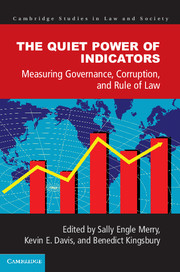Book contents
- Frontmatter
- Contents
- Notes on Contributors
- Acknowledgments
- Introduction: The Local-Global Life of Indicators: Law, Power, and Resistance
- PART I GLOBAL INDICATORS OF GOVERNANCE, CORRUPTION, AND RULE OF LAW
- 1 International Organizations and the Production of Indicators: The Case of Freedom House
- 2 Indicators and the Law: A Case Study of the Rule of Law Index
- 3 Measuring Corporate Accountability through Global Indicators
- 4 The Quest for Measuring Development: The Role of the Indicator Bank
- 5 Tradeoffs in Accountability: Conditionality Processes in the European Union and Millennium Challenge Corporation
- Part II INDICATORS IN LOCAL CONTEXTS
- Index
- Books in the Series
- References
5 - Tradeoffs in Accountability: Conditionality Processes in the European Union and Millennium Challenge Corporation
from PART I - GLOBAL INDICATORS OF GOVERNANCE, CORRUPTION, AND RULE OF LAW
Published online by Cambridge University Press: 05 June 2015
- Frontmatter
- Contents
- Notes on Contributors
- Acknowledgments
- Introduction: The Local-Global Life of Indicators: Law, Power, and Resistance
- PART I GLOBAL INDICATORS OF GOVERNANCE, CORRUPTION, AND RULE OF LAW
- 1 International Organizations and the Production of Indicators: The Case of Freedom House
- 2 Indicators and the Law: A Case Study of the Rule of Law Index
- 3 Measuring Corporate Accountability through Global Indicators
- 4 The Quest for Measuring Development: The Role of the Indicator Bank
- 5 Tradeoffs in Accountability: Conditionality Processes in the European Union and Millennium Challenge Corporation
- Part II INDICATORS IN LOCAL CONTEXTS
- Index
- Books in the Series
- References
Summary
INTRODUCTION
The American aid apparatus found itself in a quandary at the end of the last millennium. The dissolution of the Soviet Union had robbed it of one reason for being: providing material support to allies in the Cold War and bolstering friendly governments in countries in danger of succumbing to Soviet influence. Decades of anecdotal experience and recent empirical research threatened to deprive it of another, as critics suggested that US aid disbursements neither stimulated economic growth nor lessened poverty but in fact, might be correlated with worse economic outcomes in recipients. American aid budgets steadily decreased during the decade following the end of the Cold War, as the commitment of other developed nations to assisting poor countries appeared to increase. By the early 2000s, with the development of the United Nations Millennium Development Goals and an apparently renewed commitment to combating worldwide poverty among countries in the Organisation for Economic Co-operation and Development, the US aid establishment appeared in need of revitalization.
The European Union (EU) faced a different challenge in the last decade of the millennium, as the anticipated accession of Austria, Finland, and Sweden in 1996 left EU expansion at a crossroads. On the one hand, the pan-European rhetoric of the post-Soviet years suggested that the countries of Central and Eastern Europe next deserved consideration for a place in the Union; on the other hand, concerns about cultural, political, and economic gaps between EU members and would-be members made the former hesitant to commit to the latter's accession.
The United States met the challenge to its aid institutions by creating a new organization in 2004, the Millennium Challenge Corporation (MCC), that aimed to assist only governments that had demonstrated the capacity to use this assistance to benefit their people.
- Type
- Chapter
- Information
- The Quiet Power of IndicatorsMeasuring Governance, Corruption, and Rule of Law, pp. 156 - 196Publisher: Cambridge University PressPrint publication year: 2015
References
- 4
- Cited by



